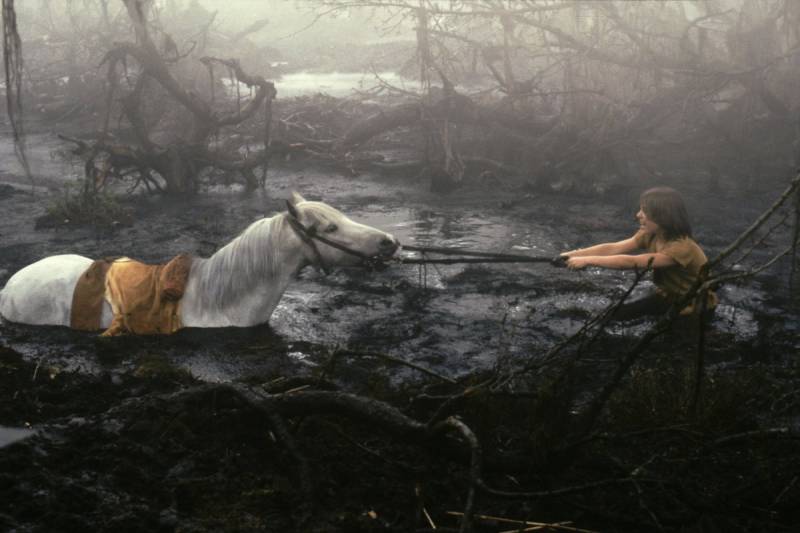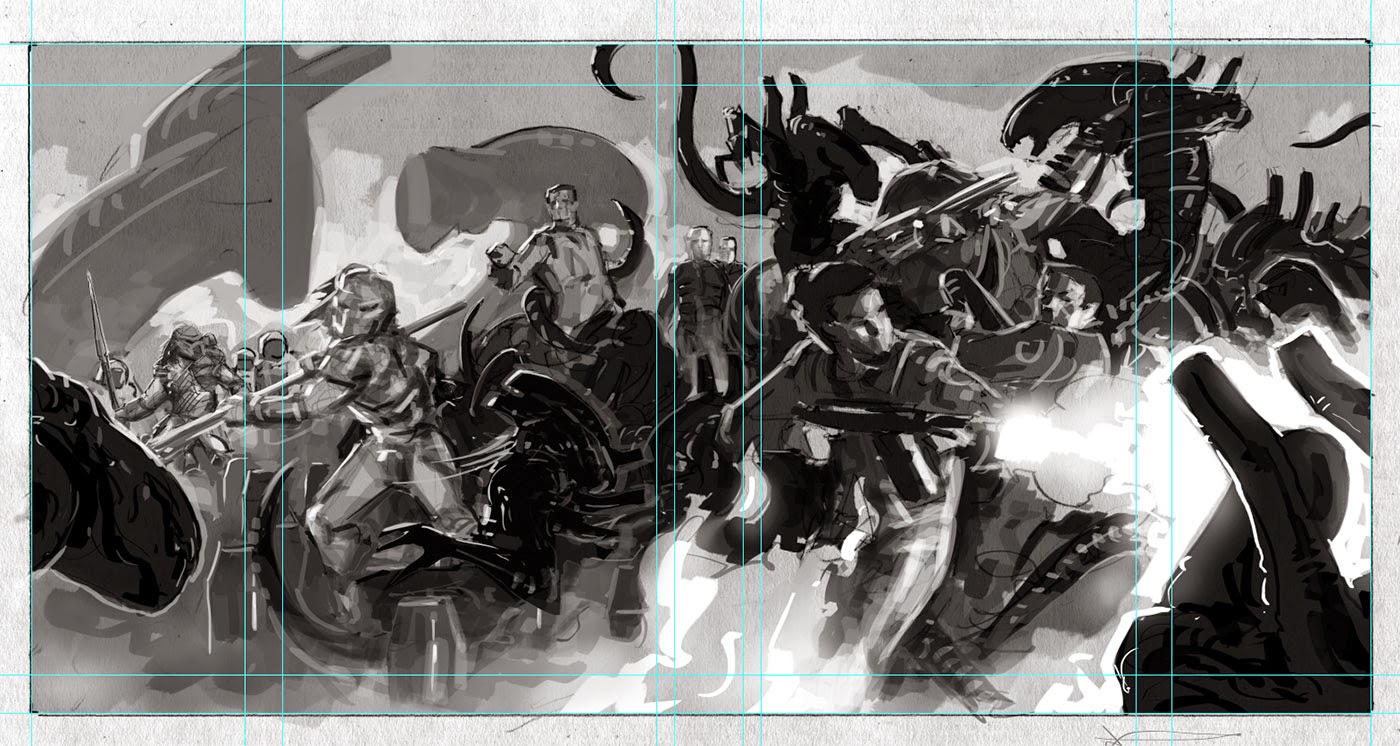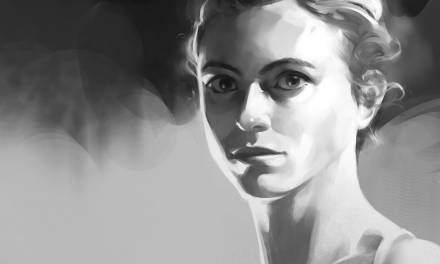
Listening in on critiques at the Illustration Master Class, a short exchange stuck in my head. Several instructors were reviewing a student’s sketches and they were having a hard time drilling down to the core idea of his intended piece. Finally, one asked the student what he wanted for people to feel when they looked at the final painting. He answered (as best I can remember) “I want people to think ‘this guy is an amazing painter’”
I’ve been thinking about that answer quite a bit because I really appreciated the honesty of it. Back when I was a student in a Fine Arts program, nobody would dare say something like that out loud. And the truth is, what I really wanted for much of my career was for people to think I was an amazing painter too.
It’s possible this attitude best suites an aspiring illustrator. It’s a job that demands chops balanced with the ability to compromise. To develop that skill level, you need to be dedicated to craft for years before it will gel. And at the same time, you are striking out on a path where that skill is used to execute other people’s ideas and build other people’s visions. Of course, there is a range of how involved the client is in any given job and I think most of us prefer artistic freedom to being just a pair of hands. We like the jobs that provide a problem to solve rather than just a solution to execute. And understanding how to solve complex visual problems is it’s own skill, and the artists who excel at it tend to get hired for the more outside the box assignments that require it.

A still from the short film “Carlin” by Brent Green. The raw emotion of this performance has stayed with me for years
Down at it’s root, having a voice as any type of artist is about having a point of view. Style and technique are not enough. They are the delivery system, but the point of view is the payload. If strong technique catches the viewer’s eye, a strong message engages them emotionally. It is what sticks with you, without which an image is forgettable. And it took me too many years to realize that messaging is it’s own skill set. Learning how to mature it, sharpen it, apply it all takes extensive practice which is separate from practicing technique.
It seems to me that I got away with undervaluing deeper substance for a good bit of my early career. My theory is that this wasn’t a major issue, particularly in genre art, because I grew up in and then emerged into an increasingly cynical cultural landscape. In my formative years, plenty of my interests were being seduced by a flash-over-story business model, from the 90s comics boom to the mutation of the genre blockbuster into… whatever is largely driving the film industry today. It’s possible this was just one facet of a trend in the broader popular culture to dismiss sentiment and embraced cynicism. The cultural current of the 90s and 2000s was an ever increasing mandate to not be a sap.
A few years back, I read an essay that introduced me to the concept of post-irony (though you can find any number of similar pieces if curious). The central thread is that irony became a shield which people use to protect against being seen as naive. It started as a tool to attack and mock the status quo, and then it became the status quo. The eventual result is a sort of low level Nihilism which I have to assume most of us see and feel strongly permeating the culture. A jaded, snarky suit of armor that says “I’m too smart to take anything seriously,” with the implication clear that being vulnerable means you deserve to get hurt.
As the week at IMC was wrapping up, the subject of sincerity, emotion, and deeper purpose had come up again and again in both lectures and conversations. It’s a topic I’ve certainly been more interested in recently. I expect some of it is just artistic growth, though I also wonder if it’s a larger reaction to the fatigue so many of us are feeling from the current social and political climate: a hunger for art which is meaningful, vulnerable, and true. Along those lines, the emptiness of heavily commercialized franchises and post-ironic entertainment feels increasingly like… nothing. And it all comes together to remind me how damn important heart is in any creation. How important a genuine point of view is.
The best word that describes what is largely missing for me is poetry. A quality which says things between the lines, because to actually say them would ruin them. This came to me while watching the new Mr. Roger’s documentary where twice, TWICE, there was a clip from the show that knocked the emotional wind out of me in a split second. I was watching the movie and then I was welling up with tears in a SECOND. You can’t dictate an emotional response like that to someone, you have to sneak it to them. And it brought me to thinking about other shows, movies, and songs which have had a similar effect on me. I remember a movie that I had been told would make me cry, but I felt no big emotional connection through the entire thing. And then, in a matter of seconds right at the end, it sprung the trap and it got me. And I mean ugly crying for 20 minutes got me, and I had someplace I needed to be and I was just walking down the street sobbing.
How does that happen? It’s something between the lines. It’s something bigger than the box it came in. It’s a shortcut past our defenses straight to the heart. And I think many of use have collectively retreated from it, and I think we all desperately need it.
On-the-nose work is the opposite of poetic. Along these lines, I’ve always had a strong distaste for artist’s statements because I thought they demanded that every feeling and symbol be planned and spelled out. If the best stuff is between the lines, how can you verbally articulate it? But of course, an artist’s statement about a poetic piece won’t make you feel the work, it just gives context for what the work will hopefully make you feel. The main reasons that I always struggled with writing a statement was an implied pressure to articulate something really specific and important. I never figured out how to verbalize my personal “why,” because it never felt good enough.
For so many years, my honest answer would also have been “to be an amazing painter.” But to get there means going deeper, because amazing paintings are far more than just technical achievement. That answer doesn’t satisfy me anymore. It’s too incomplete. But I’m starting to see a bigger picture. I’ve generally aimed to steer myself towards making work that I would find captivating. The hard question is, what is it in the work of others that cuts right through me? Heart. Truth. Connection. Poetry. A refusal to bow to lazy knee-jerk cyincism. These qualities can and should exist whether the work is personal or commercial.
I realize of course that I’m more than fashionably late to this party. And I certainly don’t want this to read as any disrespect to the student mentioned in the opening story. I came to this field as a fan who wanted to prove that I could earn a seat at the table. So this is a kind of letter to myself, and hopefully there are some folks who might also relate. Creating great work needs more than just style. It needs soul.









I love this post- very insightful and it hit a lot of personal notes for me. I feel like I’m not where I want to be in both categories and knowing that makes creating new pieces a fairly daunting task. But I guess being aware of the need for proficiency in physical technique and hitting the right emotions is a first step toward actually accomplishing both.
Thanks! Yes, and in writing this I have been thinking a lot about how the two areas of technique and substance are practiced. Technique is fairly straight forward and “testable” (at least for a realist) which I think was part of it’s appeal to me as a young artist. The rest of it is much more about introspection and curiosity, and that gets really squishy. One thing I’m trying right now is keeping a journal in addition to sketchbook to see if that helps me better understand out some of my hazier motives and impulses
Amazing post Dave!
Writing is such a great tool. Michael Mattesi speaks about making his students write their intentions before drawing a figure in his book “Force:Dynamic Life Drawing for Animators”. Travis Louie also mentioned making his students write their intentions for illustrations as well. I myself have done this for years but I’ve found that what I would write years ago was very much about what I wanted people to think. Things like “I want them to look here first at this person hiding from a search party and then look at the search party’s torches. Then see the setting” (I really loved how the Golden Age Illustrators were masters of leading the eye). Sure it communicates the idea and you know what is happening. But now I would much rather consider how I want people to FEEL. Feel how that character in hiding is terrified. Feel the tension, the apprehension. Don’t just spell it out. THAT is the hardest part of the art vs picture making.
yes, completely! And something about having intentions in writing helps me look at the sketch and ask how it could be more effective for that specific aim and then revise. Definitely helps keep me from getting distracted by shiny things in planning a picture that might water down that key goal
Thanks for writing this David. I got teary-eyed after reading this beautiful piece you wrote. I’ve been working as a professional artist for 10 years, and then just suddenly I felt lost and been suffering dark days. Was too caught up working for other people and helping their business grow – that I forgot to nurture my “soul” as an artist too and consequently create work that has soul in it. But what you shared somehow made things clearer for me. To go deeper. I couldn’t thank you enough. Thanks man.
Thanks so much!
Ah, yes, omg, so much yes.
I have been having a lot of trouble putting this into words, but yeah. There is a level of cynicism and emptiness in media around that was driving me insane for a bit. Feels like I was feeding from bread crumbs all this time.
And yet, striving to produce something that would nourish this side of me was something I was labeling internally as a deviation – something that would straight out put me out of the commercial art game.
It’s been a weird ride.
But I can tell I felt the same itch you’re describing here – where the mere technical prowess wasn’t the focus anymore. And I can even tell you a feel a bit guilty because I should probably have invested more on the technical side before making the switch, but alas, it’s been a struggle to do it only for the technical side of things.
Anyway, great text, thank you so much for being open and putting it in words and sharing. It’s another star I can follow to try and find my way through this long night.
totally, I think you have to follow where you’re genuinely interested! And though I obviously value the technical side too, I’m suspecting that higher levels of realism, particularly hyper- and photo-realism, may create something of a barrier for emotional connection. Of course, strong technique and design still exist in stylized, minimalist, and/or naive work as well, just directed towards a different purpose.
I’m curious… What was the movie that made you cry?
The way David described his experience made me flash back to when I was a teenager and made the mistake of going to see The Elephant Man in the movie theater. It was the very end that got me. I sobbed like a baby right in public. Given that being “cool” was my life’s goal at that age, I was pretty embarrassed.
I didn’t name check it mostly because it’s not one many people have seen. But the movie was called Son of Rambow, and it’s about a bunch of young kids who decide to make their own action movie inspired by First Blood. Making our own movies was one of our favorite things to do at a similar age, so I think there’s probably some deep rooted feeling there for me. I’m not sure if other people would have the same reaction, but it really hit me strong
I know the movie well. It was great.
Thanks David for sharing your thoughts, that “between the lines” thing is so elusive and is so hard to pin point that I am afraid that if we did it would stop to exist. I have asked myself often what is this thing that connects us back to great art from different time periods, and how do I capture it. What do these works of art have that move me have in common, for me it is first craftsmanship and skill. I have learned the hard way that skill and expertise alone will not get you there, it certainly helps.
Select a great work of art you truly admire and critique it by basic design fundamentals.
One can quickly pick out the artists use of elements and principles, and still not find what exactly gives that work its excellence or intrinsic appeal. (Elegance and beauty). There is an inherent quality in great masterpieces that defy and challenge technical analysis or description. To see the aesthetic value, we often must look for what is not there. This leads to the second aspect of composition, which is more intuitive and based on our feelings or sense towards the subject, “Expression”, which we must consider an element of composition, no matter how elusive or hard it may be to describe. Is the most powerful and lasting element in art.
It can make contact with our senses, emotion and intellect.
In the book The Little Prince by Antoine de Saint-Exupéry, the little prince states,
L’essentiel est invisible pour les yeux.
“One sees clearly only with the heart. The essential is invisible to the eyes.”
We can mimic each of those elements, combine them and not create a work of art of any inherent value. Why, because we create art as a whole, it is not a collection of pieces.
This intrinsic appeal or quality transcends fundamentals for they have become second nature to a master painter. It is a deep bedded artistic language requiring no more effort on their part than breathing. What we must emulate is the intellectual process, making fundamentals an innate part of our daily thinking and artistic vocabulary.
“A main objective in the art of painting is to disguise, insofar as possible, the use of methods or the influence of principles. This concealment creates, so to speak, a great mystery – an attractiveness, unseen and indescribable. This abstract quality is the element that places pictorial work in the realm of fine art.”
– – (Edgar A. Payne)
Thanks again for a great article.
Jim
Great piece, thanks for taking the time to think and write in this subject. I’ve noticed that as I get older the Question I’m asking myself is no longer “what are you”, rather it’s “who are you”. Maybe if it’s boiled down, that’s what this topic is about.
I’ve commented more than once that one of my favorite things to do at the Philadelphia museum is to go visit Van Gogh’s painting of wheatfields in the rain. Creatively it doesn’t look like anything except strokes of very muted color, but there is this terrible sadness communicated to me every time I see it. I am amazed at work that has that type of emotional impact. It doesn’t grab you by the throat with a dazzling display of hyper realistic technicality. But the soul of the artist seems to bleed out of it. Kathe Kollwitz does the same thing. I think even beyond art, any endeavor that is truly lasting is a real effort of the heart first of all.
Great Post David,
Conveyed a lot of the points that I’ve been struggling with for a while regarding technique and story telling. It goes beyond just the technical aspects of picturemaking. Coincidentally, I was a passage from Andrew Loomis’s book “Creative Illustration” in which he speaks of conveying a mood. Very pertinent!
Thanks again